As one of the overseas Vietnamese intellectuals invited home to discuss the acceleration of Industrial Revolution 4.0 in Vietnam, Dr Nguyen Hoang from the University of California-Davis has recommended the building of a knowledge ecosystem to help Vietnam’s agriculture sector take the advantages and opportunities of a developing country in the process of building smart agriculture.
Dr Hoang Nguyen completed his doctoral research on in vitro physiology recalcitrant plants at the Plant Pathology Department of the Foundations Plant Services at the University of California-Davis (UC Davis).
His research project is one of the most successful studies that received widespread attention from the public, as well as the science community.
Working at a leading university, Dr Hoang has seen the effectiveness of building a knowledge agricultural ecosystem.
According to Hoang, western countries like the US have successfully applied the agricultural extension model in which agricultural researchers and producers are connected.
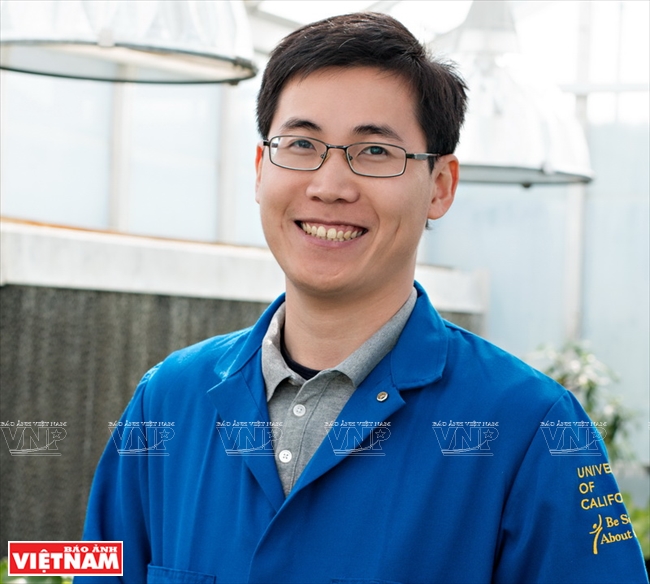
Dr Nguyen Hoang is one of 100 overseas Vietnamese intellectuals who were invited home to discuss
the acceleration of Industrial Revolution 4.0 in Vietnam.
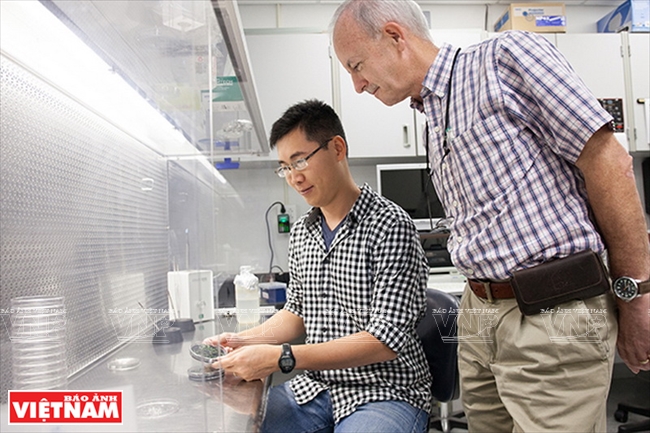
Working at the lab of UC Davis.
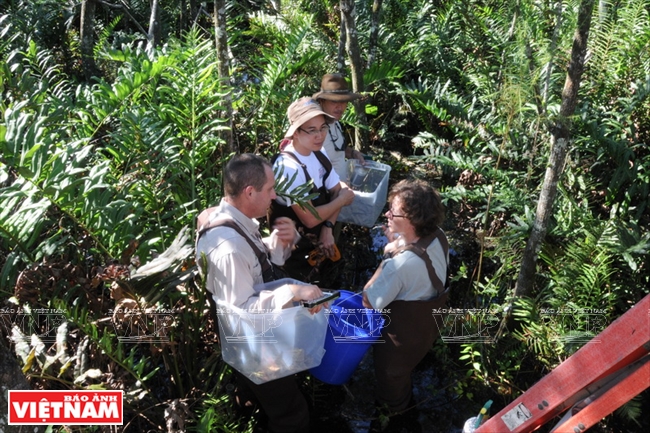
In a field visit for agricultural research in the US.
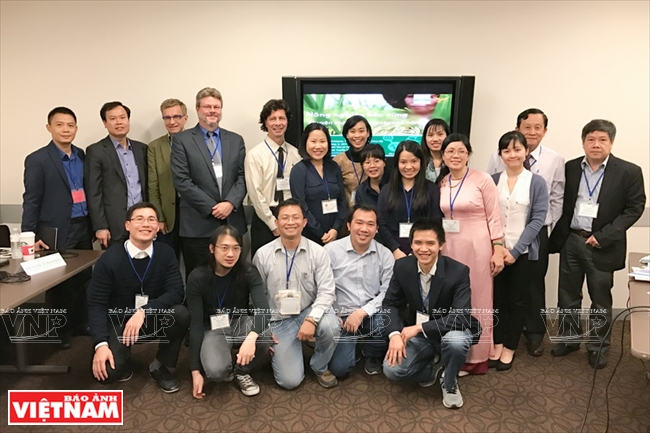
With his colleagues at the seminar on sustainable agriculture in Arizona in 2017. |
He said that in developed countries, universities, the agriculture ministry’s centers and private firms are in charge of developing agricultural technology.
According to him, intersectional projects could be done on with close collaboration among the Ministry of Agriculture and Rural Development, the Ministry of Industry and Trade, the Ministry of Science and Technology, and units collecting overseas information.
“Agricultural extension units, local authorities, and businesses could consult on such information when considering manufacturing and distribution decisions”, he said.
Dr Hoang said UC Davis and other universities in the US have worked with the agriculture ministry’s centers to jointly become a knowledge center which helps both start-ups and old businesses focus only on production.
Businesses with arising technical problems will be supported by the cooperative extension section of the agriculture ministry and universities.
“It is crucial to bridge and absorb technology from overseas in a systematical manner to serve the intensive farming and agricultural professionalization at home, reducing research costs while still ensuring effectiveness,” Dr. Hoang said.
Industry 4.0 is a golden opportunity to change Vietnam’s agriculture, Dr Hoang said, suggesting that the government, businesses and overseas students take full advantage of strain varieties and breeds and technology in developed countries for use back home.
He pointed out that the internet is the most important technology that has changed, is changing, and will change the face of Vietnam’s agriculture.
Through the internet, locals can access and update the world’s limitless knowledge and technology and directly work with international specialists. The internet is the bridge which helps people access the world’s agricultural knowledge at the lowest cost.
To tap this potential, Dr Hoang has set up the Vietnamese Agricultural Expert Network (VietAgGlobal) at www.vietagglobal.com, a California non-profit organization with the mission to connect agricultural producers in Vietnam and agricultural specialists from all over the world.
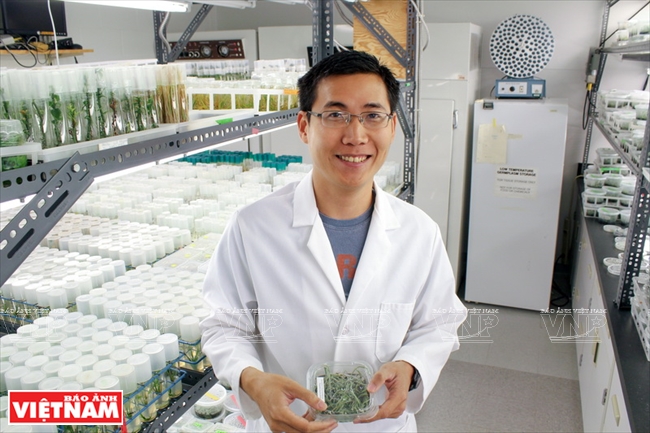
Working at a leading university, Dr Hoang sees the effectiveness of building a knowledge agriculture ecosystem.
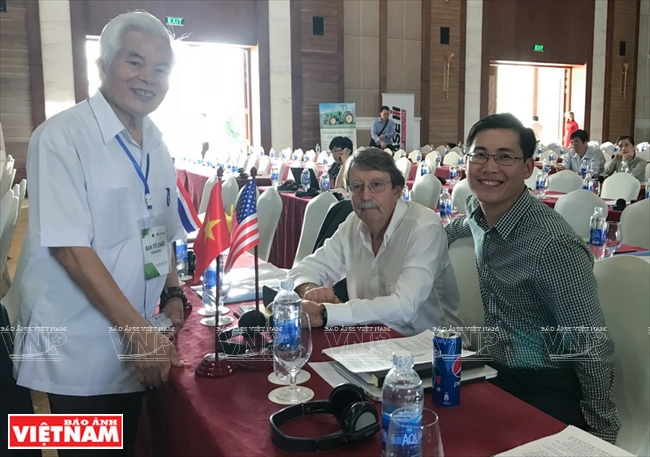
Dr Hoang and Prof Jack Comstock at a working session with Le Van Tam from Lasuco, a sugar company in Thanh Hoa.
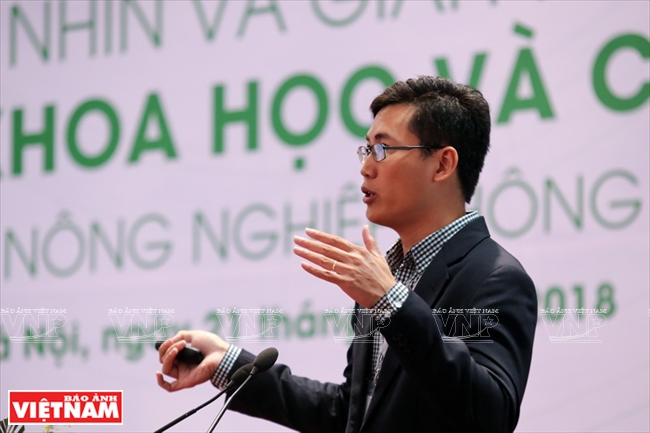
Speaking at a conference on sustainable development of smart agriculture in Hanoi. |
In the future, VietAgGlobal is set to build or assist the building of domestic and international funding databases, expert databases and online courses, which is an effective way to make use of the internet to bring knowledge to rural areas across Vietnam.
With the assistance of the Vietnam Education Foundation (VEF), Dr Hoang held two seminars on sustainable agriculture in Arizona in 2016 and the District of Columbia in 2017. He also facilitated exchange visits between Vietnam and the US.
Hoang said Vietnam should build multilateral relations with major agricultural institutions in the US, Netherlands, Israel, Japan and Australia, which is quite feasible because the world’s largest agriculture institutions such as UC Davis and Wageningen University are targeting globalization.
The frequent exchange of lecturers and students will be a premise for improving the training quality and opening up the opportunity to transfer technology from abroad to Vietnam.
“The State should invest in these bridges to help businesses easily meet qualified experts and avoid turning Vietnam into a subcontract maker of raw agricultural products,” Dr Hoang stressed.
Dr Hoang is now a lecturer of plant pathology at the Plant Technology Faculty, College of Natural Sciences, National University of Ho Chi Minh City.
“My job is to solve riddles wherever I live. As a Vietnamese, my job is more meaningful when I solve the riddles for Vietnamese people,” Dr Hoang said.
Story: Thao Vy - Photos: Viet Cuong & Files